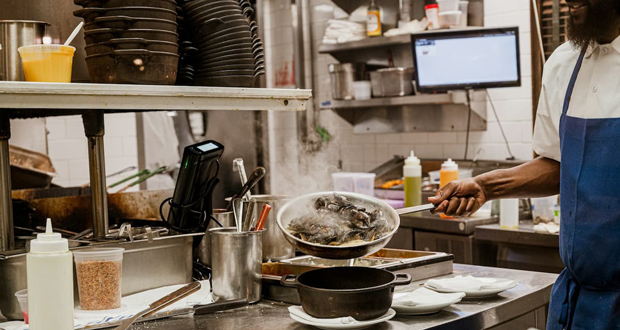By Aqua Mundus, the UK’s leading independent grease management company servicing commercial kitchen operations throughout the UK
Discover practical tips to prevent FOG (fats, oils and grease) build-up in drains with our helpful guide. Learn how to keep your kitchen legally compliant and protect your drains.
How to Prevent FOG (Fats, Oils and Grease) Build-up in Drains
Restaurants across the country tantalise our taste buds on a daily basis with their innovative dishes and flavoursome treats. But there are by–products to all this culinary expertise, and some of the most troublesome are the fats, oils and grease (FOG) needed to create these delightful meals.
It’s all too easy for kitchen FOG to make its way into the pipes and sewer that take wastewater away from the kitchen, and when they build up over time, they can cause serious blockages and can even block your pipes completely. What’s more, it’s illegal to dispose of FOG directly into the sewer if you run a commercial hot food business.
In this post, we outline what you can do to ensure your commercial kitchen stays fully operational and legally compliant when it comes to problematic FOG.
Understanding FOG
You’ve probably heard of ‘fatbergs’ – they’re often in the news for blocking sewers. The remarkable thing is that they’re even found in the largest, widest and tallest sewer pipes – no sewer can escape the buildup of FOG once a fatberg begins to form.
Fats, oils and grease that make their way to the sewer can slowly build up layer by layer as the liquid FOG turns solid and doesn’t travel any further down the sewer. FOG often begins in kitchens but becomes everybody’s problem when the entire municipal sewer system is compromised, causing issues for thousands of businesses and households each time it happens.
While fatbergs are at the extreme end of FOG mismanagement, they’re becoming more common and with the change in eating habits in the UK, are unlikely to simply disappear without intervention.
That’s why in the UK, it’s a legal requirement for any commercial kitchen that cooks hot food– whether open to the public or not – to have a grease trap or other type of grease interceptor installed to filter out FOG before it enters the sewer. Let’s take a look at some of the signs that you may not be legally compliant with the latest FOG legislation.
Signs of FOG Build-Up in Drains
Slow-Draining Sinks
One of the first indicators of FOG build-up is water draining more slowly than usual. As FOG accumulates in pipes, it reduces water flow, leading to slow drainage. Addressing this issue early can prevent complete blockages and costly interventions – the last thing you want is a knock on the door from the water company.
Unusual and Unpleasant Odours
FOG build-up often produces highly unpleasant odours. These smells occur as fats and oils decompose within the pipes, releasing gases. If foul odours linger near your sinks or drains, it’s a sign grease may be trapped in your system. If you already have a grease trap installed and still notice these odours, it’s a sign that you need to empty and clean your grease trap more often.
Regular Clogs
Frequent clogs are a clear warning of FOG build-up. Grease combines with food particles and other debris to form stubborn blockages that more often than not require professional attention. Ignoring regular clogs can result in complete pipe failure or even sewer backups, the latter of which is a serious breach of FOG regulations, not to mention the effect it can have on the operation of your kitchen. All of this can cost a lot of money.
3 Practical Tips for Preventing FOG Build-Up
Proper Disposal of Cooking Oil and Grease
You should do as much as you possibly can to avoid letting large quantities of fats, oils and grease get into your wastewater. There will always be some that gets into your sinks and pipes, but this is where a grease trap works its magic and separates the FOG from the wastewater before it gets anywhere near the sewer.
Avoid Pouring FOG Down Drains
Large quantities of FOG should be disposed of into specific FOG containers that can then be picked up by licensed waste carriers and disposed of separately and legally. Always scrape FOG from plates, pans and cooking utensils into these bins before rinsing. A grease trap can do the rest, and you can even implement a grease dosing system that automatically releases enzymes into your pipes to break down FOG even further.
Implement a Regular Maintenance Schedule
For businesses, scheduling regular drain inspections and grease trap cleaning is vital. It’s a lot to stay on top of, so you can also partner with a professional grease management provider to ensure your systems remain free of FOG build-up and your grease traps and dosing systems remain clean and in good working order.
Best FOG Practices for Businesses
Utilising Grease Traps
Grease traps are essential for commercial kitchens and foodservice establishments. These devices are cleverly engineered to intercept FOG before it enters the drainage system, while allowing wastewater to flow as normal, preventing costly blockages. Regular maintenance and cleaning of grease traps is crucial to ensuring they operate effectively – the frequency of cleaning will depend on how big your kitchen is, how many meals you cook a day and your opening hours.
Training Staff
Educating your staff on proper FOG management practices can make a huge difference. From scraping plates to disposing of oils responsibly, well-trained teams can significantly help prevent drain issues and maintain kitchen efficiency.
Call In the FOG Professionals
By following these practical tips and implementing FOG best practices, restaurants, commercial kitchens, caterers and foodservice businesses can significantly reduce the risk of drain blockages. For businesses needing professional support, contact a FOG management specialist for turnkey grease trap solutions and maintenance services.
This ensures legal compliance and operational efficiency without the burden of FOG management getting in the way of you running your kitchen and business. Ultimately, keep your drains clean, clear and FOG-free.





